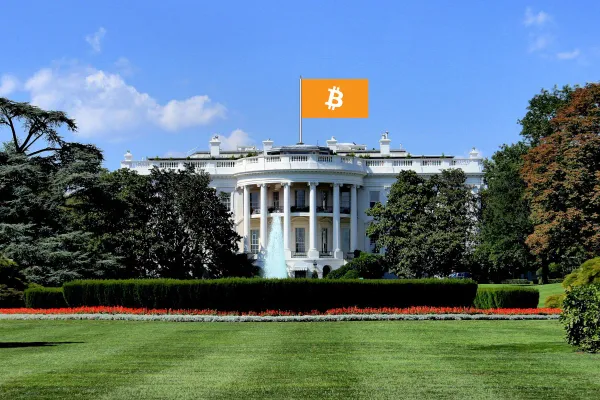Issue 35 – Pondering my orb
Also, degens on the leetest blockchains get hax0red.

This has been one of those weeks where it's very apparent to me how much my role has shifted over the last year or two towards becoming a crypto courtwatcher. The legal filings were flying this week, and not just in regards to a certain former president.
In the courts
Sam Bankman-Fried
The US government dropped the campaign finance charge against Sam Bankman-Fried this week, after The Bahamas informed them they had not intended to extradite him on that charge.
The "SBF is going to walk" crowd of conspiracy theorists — who broadly think that SBF's past political donations to Democrats have bought him a ticket out of any convictions for his alleged crimes — immediately went full throttle, claiming this was only the beginning as the criminal justice system lets SBF get away with it. Never mind that Sam Bankman-Fried's political donations were actually pretty evenly distributed across the political spectrum1 — he was just a lot louder about the donations to the Dems, and the people advancing these theories tend to be folks on the right, such as Vivek Ramaswamy and Glenn Greenwald.
The truth is a bit less salacious, I think. The United States has to honor its treaty obligations to other countries, and Sam Bankman-Fried still has twelve other charges left to wiggle out of. As Ken White (aka Popehat) put it in a recent episode of his podcast, The Bahamas' objection to the charge is "like saying 'okay, you can shoot him, but you can only have eight bullets, not nine'". Getting the charge dismissed is a win for SBF, no doubt, but he's got a hell of a lot more battles left to fight.
Meanwhile, SBF is also trying to wiggle out of the government's request that the judge remand him to jail after he made more than 100 calls to New York Times reporters in what the government alleges is an attempt to influence the jury and intimidate witnesses, particularly former Alameda CEO and ex-girlfriend Caroline Ellison. See last week's newsletter for the full rundown on the background. At last week's hearing, no decision was made on whether SBF will go back to jail, but he was temporarily gagged from talking to journalists.
Now, the government has submitted their formal request to the judge to revoke his release and remand him to MDC Brooklyn to await trial.2 SBF and his team have opposed it,3 objecting to the government's argument that he spoke to journalists with the intentions they've described, and saying that he was instead just exercising his right to free speech. They argue that sticking SBF back in jail based on this would be a violation of the First Amendment, an argument they've backed with an affidavit from renowned constitutional scholar Laurence Tribe.4 Tribe thinks that there is insufficient evidence that SBF was attempting to tamper with witnesses, and that the government's request amounts to them asking the judge to "surmise nefarious intent" in his "otherwise lawful exercise of his constitutional rights to speak to the institutional press". SBF's lawyers also argue that his being in jail will make it impossible for him to participate in his defense, since he won't have Internet access, and it will be extremely challenging for him to review the massive volumes of materials.
The government fired back,5 arguing that it's absurd to describe SBF's participation in the NYT piece as simply providing background on an article that was already independently underway, given the volume of communications with the reporter and how long they've been communicating. They also dispute SBF's team's attempt to characterize his communications as merely attempting to deny his guilt or protect his reputation, given that the documents he shared were highly personal and private diary entries by Caroline Ellison, not his own perspectives.
They also pushed back on the affidavit from Laurence Tribe, writing first that SBF's team had not sought permission to file what is effectively an amicus brief, and questioning Tribe's connections to parties in the case as "a professor who is affiliated with the law firm representing the defendant's father in connection with the Government's investigation [Kaplan Hecker & Fink]." They also questioned his understanding of the facts when he wrote that "Mr. Bankman-Fried has a constitutional right—when sought out by reporters for his perspective on stories they are writing—to avoid projecting a false image of someone who is media-shy or, worse, someone whose consciousness of guilt makes him shun the media rather than being forthcoming." Per the government: "Whether or not the Constitution does enshrine such a right, it is certainly not implicated here, where the defendant did nothing to counter a perception of being 'media-shy' inasmuch as he shared Ellison's writings anonymously and declined to be cited or quoted in the Article at all." I have to add that Tribe might be the only person willing to describe SBF as "media-shy", given that people can't seem to get him to stop talking about his crimes.
Finally, they rebut the argument that SBF will not be able to adequately participate in his defense from jail, arguing that SBF is seeking special treatment. "MDC houses a large number of detainees awaiting trial, all of whom have access to participate in their defense and are not deprived of a fair trial as a consequence of their detention."
Meanwhile, the New York Times,6 the Reporters Committee for Freedom of the Press non-profit7 and documentary filmmaker Nanette Burstein8 (who is evidently working on an FTX documentary) all want the judge to lift the temporary order limiting SBF from talking to reporters. All base their requests on First Amendment grounds, as is to be expected on such a broad gag order that is genuinely of questionable constitutionality.
This has been an interesting skirmish to watch, and hopefully I'll have a final update on it soon. I previously got the vibe that Judge Kaplan is fed up with SBF's incessant antics and quite ready to stick him back in jail, but we shall see.
Terra (and also Ripple)
A decision in the SEC case against Do Kwon and Terraform Labs has poured some cold water on those excited about the recent decision in SEC v. Ripple. As discussed in my special edition, "XRP: Schrödinger's security", there were already questions over whether Judge Analisa Torres' decision on motions for summary judgment will stand.
Now, Senior U.S. District Judge Jed S. Rakoff has issued an order in the SEC v. Terraform Labs case denying Terraform Labs' and Kwon's motion to dismiss.9 In it, he explicitly declined to follow the decision in the Ripple case, writing:
It may also be mentioned that the Court declines to draw a distinction between these coins based on their manner of sale, such that coins sold directly to institutional investors are considered securities and those sold through secondary market transactions to retail investors are not. In doing so, the Court rejects the approach recently adopted by another judge of this District in a similar case, SEC v. Ripple Labs Inc….
He writes that, in his opinion, the XRP tokens are not themselves securities, but Ripple's sales of them to fund their endeavors were. This is thus bad news for Terra's arguments that "Luna sales weren't securities offerings because, look here, a judge just said [some of] Ripple's weren't!", and an ill portent for all the companies who are trying to draw upon the Ripple ruling to argue their own defenses against SEC lawsuits.
According to former SEC enforcement attorney John Reed Stark, "Judge Jed Rakoff is arguably considered the most respected and experienced securities law jurist not only in the SDNY but perhaps in the entire U.S. federal court system."10
Coinbase
One such company defending against an SEC lawsuit is Coinbase, and they just filed a motion to dismiss the case, as is to be expected at this stage.11 The motion is based on the argument Coinbase has been making all along: essentially, "we don't trade securities, so the SEC has no business here." They lean heavily on the recent Ripple order to do so: "The Ripple court found no investment contract based on facts substantially identical to those alleged here".
We'll see if District Judge Katherine Polk Failla is more amenable to that than Judge Rakoff was. The motion to dismiss is more an exercise that any competent legal representation will attempt rather than a tactic that's likely to succeed here — dismissal at this stage would be shocking — but it will be interesting to see Failla's treatment of the arguments.
Hex
[W3IGG]
The latest addition to the list of SEC lawsuit targets is Hex, its garishly-dressed founder Richard Heart, and other projects of his. They say that, despite Heart's best efforts to tiptoe around describing his tokens in terms that might attract the attention of securities regulators,12 he's been conducting unregistered securities offerings amounting to more than $1 billion.
Not only that, they allege he and PulseChain misappropriated at least $12.1 million to fund Heart's lavish lifestyle. Among other things, he purchased a McLaren sports car, five luxury watches, and a $4.3 million 555-carat black diamond called "Enigma", allegedly using funds from the sale.
Personally I am shocked — just shocked — that Richard Heart (in the video above) has been accused of such a thing.13
Binance
Neither Binance nor the SEC wanted that bizarre group calling themselves Eeon (see Issue 33) to intervene in the lawsuit. The judge has denied the motion to intervene because in order for a third party to intervene in SEC enforcement actions, the SEC has to consent.14
Bitfinex hackers
As I wrote last week, Ilya Lichtenstein and his wife Heather "Razzlekhan" Morgan reached a plea deal in the case where they've been charged for laundering the proceeds of the 2016 theft of almost 120,000 BTC (priced at around $72 million then, ~$3.5 billion at today's prices and almost a billion more than that at the time of their arrest in February 2022).

It was previously not clear if Lichtenstein and Morgan were the actual perpetrators of the theft, or if they were just rubes put in charge of cleaning the dirty funds. Now, Lichtenstein has admitted as a part of the plea deal that he was responsible for the hack itself.15 He faces a maximum of twenty years in prison on conspiracy to commit money laundering, and the stolen Bitcoins will be permanently forfeited. Morgan's charges are less severe: one count each of money laundering conspiracy and conspiracy to defraud the United States, each of which come with five year maximum penalties. She was mostly involved in the hiding of the funds, not the hack itself, and did things like bury some of the assets that had been cashed out and converted to gold coins. I assume these coins were recovered with the assistance of a treasure map with an X marking the spot.
In bankruptcies
FTX
I made the mistake of dismissing the FTX bankruptcy team's exploration of restarting the exchange as mere base-covering, as you can see in Issue 32. Turns out they actually genuinely seem to want to do it.16 The plan still needs to be ratified, but it seems they want to reboot FTX's non-US exchange. Why anyone would want to use it is beyond me, particularly after the bankruptcy team went into excruciating detail about how godawful the whole thing was.
…and Genesis
FTX and Genesis, meanwhile, have reached an in-principle agreement to settle. FTX wanted to claw back "avoidable transfers" of $3.9 billion, later reduced to $2 billion, but Genesis claimed they owe FTX nothing. It's not clear what this agreement actually entails, as it has not been publicly released.17
In governments and regulators
Rep. Patrick McHenry (R-NC), chair of the House Financial Services Committee, says talks on the proposed stablecoin regulation have stalled: "Unfortunately there was a third party in this negotiation that did not share the same sense of urgency: the White House". It doesn't sound like they'd have much luck even if the White House made this priority number one, though: Rep. Maxine Waters (D-CA) described the bill as "deeply problematic and bad for America", and lacking the support of the Fed, the Treasury, and others.18
The SEC issued a statement warning accounting firms of liabilities they may be taking on if they choose to audit crypto firms, writing that crypto firms have been marketing and describing limited attestations by accounting firms in "misleading" ways that could suggest that they are equivalent or even more precise than a true audit. When this happens, wrote SEC Chief Accountant Paul Munter, "The accounting firm should consider making a noisy withdrawal, disassociating itself from the client, including by way of its own public statements, or, if that is not sufficient, informing the Commission."19 This seems to harken back a bit to December, when Mazars produced a "proof of reserves" report for Binance, then almost immediately retracted the report and abandoned working with the company due to "concerns regarding the way these reports are understood by the public" [W3IGG].
Worldcoin recently launched with some fanfare, as I wrote about in my recent special edition where I pondered their orbs.

Some regulators have begun raining on their parade, with French and German regulators reportedly coordinating on a privacy-focused investigation. "The legality of this collection seems questionable, as do the conditions for storing biometric data," said France's regulator. Britain's privacy authority also confirmed they were "making enquiries" about the project.20 Worldcoin is facing even more serious issues in Kenya, where the government has ordered them to close up shop entirely due to data privacy concerns.21
In Binance
Semafor says DOJ officials are considering charges against Binance.22 This comes almost eight months after Reuters said DOJ officials were considering charges against Binance.23 According to Semafor, these officials are worried that charges might cause customer harm if there's a run on the exchange. To me, this seems to suggest they're concerned that Binance is insolvent, because otherwise a run on the exchange (which should simply be custodying cryptocurrencies, not lending them out or doing other things with them as turned out to be the case with FTX) should not be catastrophic. I would think that allowing an insolvent exchange to continue operating would be more damaging to consumers than shutting it down, but what do I know?
The Wall Street Journal says Binance's business in China currently amounts to 20% of its volumes — despite crypto trading being illegal there since 2021. Binance, as you might expect, denies everything. If the WSJ is correct, Binance's business in China is by far their largest operation.24
The Web3 is Going Just Great recap
There were 9 entries between July 27 and August 4, averaging 1 entry per day. $117.98 million was added to the grift counter.
Chaos at Curve
[link]
A bug in Vyper, one of the smart contract programming languages for Ethereum, allowed for a massive string of exploits on Curve Finance and projects running Curve pools. The total amount lost is inexact, since some funds were pulled from the ecosystem legitimately, some were stolen, and some were "rescued" in exploits by whitehats seeking to preserve the vulnerable assets. All told, it's probably somewhere in the ballpark of $60–100 million. However, the hacker seems to have started returning some of the funds,25 apparently in response to a 10% bug bounty offered by the platform in exchange for a promise that "you will have no risk of us pursuing this further, no risk of law enforcement issues, etc." This seems like an awfully bold promise, given that we've seen plenty of examples where platforms have promised to not involve law enforcement and then charges have been filed anyway.
The chaos was worsened by the existence of massive CRV-backed loans by Curve founder Michael Egorov, which faced grave liquidation risks as the price of CRV dropped as a result of the exploits. The loaned CRV amounts to 34% of CRV's total market capitalization and 47% of circulating supply, meaning that forced liquidation could be an existential threat not only to the CRV ecosystem but to lending platforms that were exposed.26 Egorov apparently called in some favors and was bailed out by a cast of characters including Justin Sun, Jeffrey "MachiBigBrother" Huang, and Cream Finance, who purchased some of his CRV tokens, apparently allowing him to pay down the loans a little bit. Though disaster seems to have been averted, it has sparked discussion among defi protocols and the crypto industry more broadly about whether such huge, potentially existential positions should be allowed at all. In an article in CoinDesk, Daniel Kuhn wrote "DeFi Died and We Didn't Even Notice", arguing that this incident illustrates that the defi ecosystem has proven itself to be disappointingly similar to traditional finance.
Bedlam at Base
Base is the Coinbase-run layer-2 Ethereum network, which is still in its testing phase, though rumored to be launching very soon. Despite its alpha status, people started pouring funds into the network last week, hoping to scoop up a memecoin called $BALD — evidently named for Coinbase CEO Brian Armstrong's rather egg-like appearance.

The memecoin did what viral memecoins do, and surged in price by around 4,000,000% as it gained traction on social media. Then it all came crashing down when the deployer of the token sold off $25.6 million, tanking the token price.
People on social media were quick to observe connections between the deployer wallet and FTX, and some began scrutinizing the $BALD Twitter account for apparent linguistic similarities to Sam Bankman-Fried (who is on house arrest with only a flip phone and a laptop with extremely restricted Internet access). However, it seems that we will probably not see "creating and rug-pulling a memecoin" added to the list of things SBF has done to piss off the judge since being granted release on bond, because the $BALD deployer now appears to be a pseudonymous crypto trader known as Milkyway.27
Leet hax0rs
The day after the $BALD saga, Base's main DEX, LeetSwap, was exploited for around 342 ETH (~$624,000). The project describes itself as "The #1 DEX ecosystem for elite degens built on the leetest blockchains", in possibly the cringiest sentence written in recent history.
A vulnerability in one of the functions in the LeetSwap contract allowed an attacker to manipulate token prices and exploit the project.
Altogether, not a great start for a network that hasn't even launched yet.
Everything else
- Uwerx crypto-based freelancer platform exploited [link]
- Phisher briefly snags $20 million before it's frozen by Tether [link]
- SEC goes after Richard Heart and his projects Hex, PulseChain, and PulseX [link]
- Kannagi Finance rug pulls for over $2 million [link]
- Memecoin launch by Pauly0x costs traders at least $2.2 million [link]
- DeFiLabs rug pulls for $1.6 million [link]
In the news
TRASHFUTURE. "The Great Leap Orbward ft. Molly White".
I joined the lovely folks at TRASHFUTURE to discuss Worldcoin and The Orb (not a synthwave band, but it should be). This is a premium episode, meaning it's only available to subscribers, but you should consider becoming one if you aren't. Hope we cross Orbs soon!
Worth a read
. "The tragedy of Sam Bankman-Fried's plan to buy Nauru".
Last issue, I spent only a paragraph on Sam Bankman-Fried's brother's memo about buying the tiny sovereign nation of Nauru, which he hoped would allow them to build a sort of island bunker for effective altruists. Paris Marx gives this the word count it deserves, and goes into some of Nauru's history.
A self-critical article about the world of decentralized finance, or perhaps a eulogy for it. "If DeFi was ever really different, it's now run by a few massive bag-holders."
That's all for now, folks. Until next time,
– Molly White
References
"FTX billionaire Sam Bankman-Fried funneled dark money to Republicans", The Guardian. ↩
Letter Motion for an Order of Detention filed on July 28, 2023. Document #184 in United States v. Bankman-Fried. ↩
Letter Motion in Opposition to Government's Letter Motion for an Order of Detention filed on August 1, 2023. Document #185 in United States v. Bankman-Fried. ↩
Affidavit of Laurence H. Tribe filed on August 1, 2023. Document #185-1 in United States v. Bankman-Fried. ↩
Letter filed on August 3, 2023. Document #188 in United States v. Bankman-Fried. ↩
Letter filed on August 2, 2023. Document #187 in United States v. Bankman-Fried. ↩
Letter filed on August 4, 2023. Document #192 in United States v. Bankman-Fried. ↩
Letter filed on August 4, 2023. Document #191 in United States v. Bankman-Fried. ↩
Opinion and Order filed on July 31, 2023. Document #51 in SEC v. Terraform Labs. ↩
Memorandum of Law in Support of Coinbases's Motion for Judgment on the Pleadings filed on August 4, 2023. Document #36 in SEC v. Coinbase. ↩
Per the SEC press release: "The complaint further alleges that Heart attempted to evade securities laws by calling on investors to "sacrifice" (instead of "invest") their crypto assets in exchange for PLS and PLSX tokens." ↩
Video via Tiffany Fong on Twitter. ↩
Minute order filed August 3, 2023. SEC v. Binance. ↩
"Bitfinex Hacker and Wife Plead Guilty to Money Laundering Conspiracy Involving Billions in Cryptocurrency", press release from the Department of Justice. ↩
Chapter 11 plan filed on July 31, 2023. Document #2100 in In re: FTX. ↩
Letter filed on July 27, 2023. Document #555 in In re: Genesis Global Holdco. ↩
"US stablecoin talks stall, as senior House Republican blames White House", The Block. ↩
"The Potential Pitfalls of Purported Crypto 'Assurance' Work", SEC. ↩
"France and Germany Coordinating on Worldcoin Investigation", Decrypt. ↩
"Worldcoin suspended in Kenya as thousands queue for free money", BBC. ↩
"U.S. prosecutors worry Binance charges could cause run on exchange", Semafor. ↩
"Exclusive: U.S. Justice Dept is split over charging Binance as crypto world falters", Reuters. ↩
"Crypto Is Illegal in China. Binance Does $90 Billion of Business There Anyway.", Wall Street Journal. ↩
"Looter Behind $61M Curve Hack Starts Returning Assets, Raising Hope for Recovery", CoinDesk. ↩
"Curve Founder's $168M Stash Is Under Stress, Creating a Risk for DeFi as a Whole", CoinDesk. ↩




